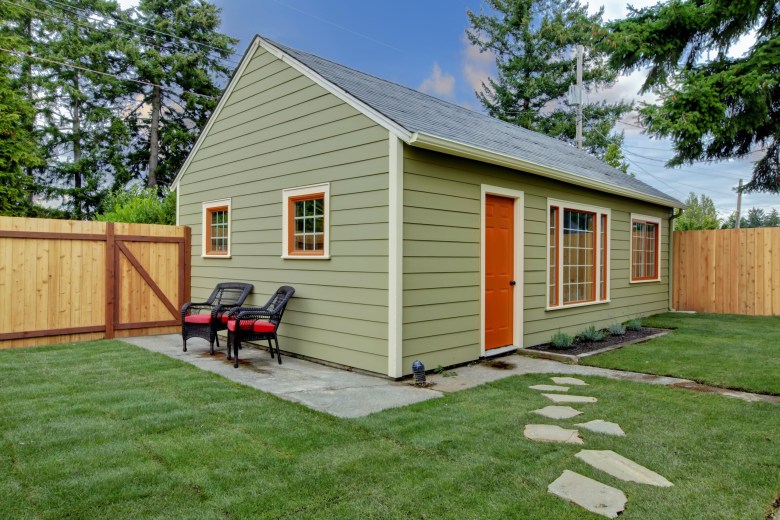In order to comply with a new state law that facilitates property owners’ construction of auxiliary dwelling units, or ADUs, the Little Rock Board of Directors voted 8-1 on Tuesday night to adopt an ordinance.
Every director supported the municipal legislation, with the exception of Ward 7 Director BJ Wyrick. (Ward 2 Director Ken Richardson did not attend because it has been more than a year since he last attended a city board meeting.)
Two officials from Northwest Arkansas, state senator Bart Hester (R-Cave Springs) and state representative Nicole Clowney (D-Fayetteville), sponsored the new state law in a nonpartisan effort. ADUs are defined under Act 313 as self-contained, independently accessible living units on the same lot of land as a single-family dwelling of greater square footage. They are also referred to as carriage houses, mother-in-law suites, garage apartments, backyard cottages, etc. According to the regulations, ADUs can be attached, detached, or inside an existing single-family home and must have their own kitchen, bedroom, and toilet facilities.
The new state law prevents Arkansas communities from restricting or outright prohibiting ADUs. For instance, towns cannot mandate that more parking be constructed to serve ADU tenants or that the layout of ADUs must resemble that of the primary residence.
ADUs cannot be constructed on a lot before a single-family home is located there, according to the ordinance that the city board voted on Tuesday. It also places a cap of one ADU per single-family home property. Although the city is still soliciting feedback on the matter, Little Rock authorities have presented the legislation as a sort of stopgap measure to guarantee adherence to the new law, which went into force on August 5. To debate ADUs, the city is hosting a community meeting on Monday, August 25, and has posted an online poll for locals.
Before the ordinance was passed, a number of residents in Shannon Hills, a city in Saline County that borders a section of Southwest Little Rock, voiced their concerns to the board.
Former Downtown Neighborhood Association president Kathy Wells supported the ADU policy but also believes further municipal regulations are necessary. However, she expressed her displeasure that the matter was being handled at such short notice.
Since ADUs might be challenging to get to from the street, Wells stated that she wanted the city to consider how first responders would approach one. Additionally, according to Wells, ADUs might depress property values, negating the appeal of the property for homeowners hoping to supplement their rental income.
Wells stated that the optimistic ideas of “hey, let’s get this in there in the backyard and start collecting rents and doing a little profit making” might not be the solution.
Although she complies with state legislation, Angel Townsend Burt, executive director of the Dunbar Historic Neighborhood Association, stated that she would like the city to make sure that ADUs showcase the craftsmanship and architectural styles of historic neighborhoods. South of Little Rock’s downtown, the Dunbar area is a historically Black neighborhood.
Townsend Burt added, “And please provide architectural drawings so that developers and homeowners alike aren’t left guessing.” Because in the absence of direction, this process will favor wealthy people who can afford to hire architects while excluding common citizens.
“The ADU law is another way to push duplexes into an area of single family residential,” Shannon Hills Mayor Mike Kemp told the Little Rock city board.
At last week’s agenda-setting meeting, Director Wyrick, who represents the area of Southwest Little Rock that borders Shannon Hills, had similar concerns regarding the construction of duplexes.
Similar to Wyrick, Kemp claimed to have discussed the new state law’s purpose with state lawmakers, who stated that duplex construction was not its goal.
Kemp has expressed dissatisfaction with neighboring Little Rock residences using a water tower in Shannon Hills that was financed by a bond backed by his city’s citizens. Adding more housing units to the Little Rock community can make the issue worse.
According to Kemp, it’s really just taking our resources without consulting us.
Local resident Shelly Reed added that she is against a developer constructing duplexes close by. She expressed her wish that the city board would hold off on voting until after the August 25 community hearing, even though she did not state that she was completely against ADUs.
In response to residents’ worries about the new state law on ADUs and another new law that removed cities’ capacity to enforce laws in certain regions just beyond their city bounds, At-Large Director Antwan Phillips asked City Attorney Tom Carpenter if the city was powerless to address these issues.
According to Carpenter, the state legislature has prevented the city from responding. According to Phillips, the city is not responsible for a large portion of what will ultimately occur as a result of this law.
Wyrick made an effort to postpone the vote until the following board meeting. She expressed uncertainty as to why the city would have a public meeting on the matter following an ordinance vote.
According to Brad Jordan, director of the city’s planning department, city employees believe the ADU problem will likely be debated for years to come.
Jordan stated, “I believe there is a misconception that everything we do is set in stone.” That isn’t true. It is our responsibility to incorporate state law into our code.
According to Jordan, Little Rock staff is requesting the most stringent interpretation of the new ADU statute for the time being because state law and local regulations differ and can be confusing.
Jordan underlined that after speaking with the community, staff would continue to research the matter and that the city needs to have an ordinance in accordance with state law.
We can really begin using the survey at that point, Jordan added, if any board members are interested in visiting this in their ward. I am aware that this is a continuous process.
The move to postpone the ordinance’s vote was defeated 6-3 by the votes of Phillips, Wyrick, and At-Large Director Joan Adcock.
According to Ward 5 Director Lance Hines, the city would not be in line with state law if the ordinance was not passed that evening.
After we receive feedback from the community, we can make changes to this ordinance, Hines stated. Like some of the other cities, we can further modify it to meet our community requirements.
According to Carpenter, as long as it doesn’t violate state law, the city will have the authority to add or remove portions of the ordinance.
In other events, the board approved the construction of four tiny homes in the Hanger Hill neighborhood by a vote of 6-3 to developer Mike Orndorff.
Orndorff’s proposals were previously turned down by city planning officials because the tiny home complex lacked driveways, forcing cars to park on the street. Numerous local neighbors have voiced their opposition to the expansion for a variety of reasons, such as traffic congestion and accessibility concerns. Adcock voted against it on Tuesday, as did directors Andrea Lewis and Virgil Miller.
It’s dragon-slaying time!
The Arkansas Times, which relentlessly defends the fundamental rights and liberties in our community, stands as a light of truth in an era when critical voices are being silenced more and more. Our commitment to provide uncompromising journalism has never been more important, especially with Arkansas in the center of a broad culture war that is impacting our libraries, schools, and public conversation. We can’t accomplish our goals of defeating dragons and holding those in positions of authority responsible alone. You can guarantee that independent journalism in Arkansas not only endures but flourishes by making a contribution today. We can join the fight and make a difference together.







